心理语言学的视角下网络语言 ——我之简单看网络语言
单位:10级心理2班
姓名:赵霄娜 学号:2010411514
心理语言学是在心理学和语言学的结合点上产生的一门新兴学科,迄今仅有近半个世纪的历史。其初期的研究主要受行为主义思想的支配,大多从刺激、反应和强化而逐渐形成。20世纪60年代,乔姆斯基(N.Chomsky)提出了生成转换语法理论及表层结构和深层结构的概念。而后致力于证明乔姆斯基句法理论的心理现实性的研究,成为心理语言学研究中的主流。到70年代,在继续研究句子的句法结构怎样认知加工的同时,开始注意研究句子的意义。研究问题也逐渐有简单的单个句子发展到段落或课文的认知加工。“句子加工”和“课文加工”构成心理语言学两个最大、最主要的子领域。
20世纪90年代以来,随着互联网的普及,虚拟环境中的语言成为心理学和语言学研究的一大亮点。网络语言可以说是现代语言的一种社会变异,是伴随网民这一群体的出现而产生的社会语言现象。例如,
宅女宅男,剩男剩女,屌丝儿,**姐,**哥,碉堡了,超逊等等。
这些网络语言不仅仅反映了社会文化方面的的现实,还受社会心理因素的制约,体现了语言的交际功能和美学功能,同时也是社会认知活动的反映,具有认知理据性。词语作为自然语言的表意系统中的基本信息载体单位,作为发现世界、解释世界过程中的重要认知元素,是语言系统中最活跃的部分。在语言的发展和演变中,词汇的变异最为显著。现代社会已经进入信息化时代,网络成为人们生活的“必需品”,网络语言的成为新的语言变异的宠儿,其最大的特点也就表现在词汇上。
有学者认为语言变异是社会语言学中的一个重要概念,是指语言在使用中偏离语言常规的一种现象。语言常规和变异之间的矛盾是语言使用中语言的结构形式和表意功能之间矛盾的体现和反映。常规的语言结构形式是相对稳定的,但人类社会是不断变化的,要面对新的科技发展的挑战,适应数字化生存方式,体现多元的社会文化价值,不断改变原有的生活方式和行为模式。网络语言的出现和发展便是这个时代的语言发展产物。网络语言——语言变异不是任意的、无目的的,是受交际者的社会心理因素影响和人类认
知机制的制约的。
网络语言的出现和发展具有一定的心理显著性。从心理学角度讲,语言变化的主要目的是引起别人的注意,满足人的心理需要,是语言独树一帜。同时,语言的变异也体现了人的审美意识。下面介绍几种常见的网络词汇变异的方式。
第一、数字符号:如“201314(爱你一生一世)”这是最近一部电影的名字,可见网络语言的影响之大。“886(拜拜喽)”“555(呜呜的哭)”“748(去死吧)”;
第二、网络术语:如“大虾(资深网虫)”“菜鸟(网上新手)”;
第三、拼音缩略:如“BT(变态)”“PMP(拍马屁)”;
第四、谐音:“驴友(背包一族,喜欢旅游的人)”“什么银呀(什么‘人’呀)”“小强(蟑螂,泛指生命力特别顽强的人)”“灰常(非常的意思)”“顶(同意)”“赞(很欣赏,很好)”;
第五、语码混合:如“U2(you too,你也是)”“3ku(thank you,谢谢你)”;
第六、其它:如“包子(某人很笨,或者长相欠佳)”“白骨精(白领+骨干+精英)”“酱紫(这个样子)”“偶(我)”“介个(这个)”。
网络语言作为网络的伴生物相应而生,在使用过程中初步形成了鲜明的个性化特征。网络为网民们提供了充分发挥想象力和创造性的自由空间,网民们能够在网络上最大限度地发挥自己的想象力和创造性。网络语言发挥了作者的自由性,做到了语出惊人令人瞠目。另外,网络语言以这些简单的符号来传达丰富的思想感情和内涵,最大限度地反映个人在语言上的创造力,具有很强的心理显著性,传递着一种 特殊的审美信息,是一种新的审美文化对现实文化的反叛和超越。
在网络语言出现的背后,有一定的心理机制。首先,以图像为刺激特征的网络语言变异词汇,即前文中提到的很多网络术语都有效的利用了图像刺激,从而生动形象的传递信息。例如,顶:支持。汗:尴尬。楼主:在某论坛里,发起某个话题的作者。因为他是整个话题的缔造者,没有他就不可能出现这一系列的讨论,因而此人被称为“楼主”。
另外,以声音为刺激的网络语言。如:“酱紫”这个词,是“这个样子”的港台读法,具有很重的颜色感,十分惹眼,令人一见倾心。“4242”的意思就是“是啊是啊”。这些词语通过声音刺激是交际者对此语言符号进行编码和解读,从而达到认知和交际目的。同时
体现了交际者的个性和创造力。
对于网络语言的出现和发展的简单思考,只是从网络语言的表面上进行了一点儿分析。对于网络语言的研究可以借用前人屈原的名言:路漫漫其修远兮,吾将上下而求索。
作者注:
亲爱的波波老师,从西方心理学史,到心理测量,再到心理语言学一直兢兢业业,交给大家很多很多。不仅仅如此,很文艺的波波老师的课总是那么生动、有趣。谢谢你,亲爱的波波老师!!!
心理语言学
作业
姓名:赵霄娜
年级:10级心理2班 学号:2010411514
第二篇:心理语言学 1
About the course
Psycholinguistics is interdisciplinary in nature and is studied by people in a variety of fields, such as and It is an area of study which draws insights from linguistics and psychology and focuses upon the comprehension and production of language. This course will explore the principles of psycholinguistics along with selected applications.
Topics to be covered include…n
n
n
n
nGeneral issues of psycholinguisticsLanguage comprehensionLanguage production and conversational interactionLanguage acquisitionLanguage in perspective
About the textbooks
Required Readings:
lCarroll, D. W. 2008. Psychology of Language.Beijing: Foreign
Language Teaching and Research Press
Aitchison, J. 2000. The Articulate Mammal: An Introduction to
Psycholinguistics. Beijng: Foreign Language Teaching and Research Pressl
Expanded Reading
Garman, M. Psycholinguistics. 2002. Beijing:Peking University Press
About the author
nProfessor of Psychology at
University of Wisconsin-Superior
B. A. (1972). University of
California at Davis. Psychology and Philosophy.
M. A. (1973). Michigan State University. Experimental and Developmental Psychology.Ph. D. (1976). Michigan State University. Experimental and

Developmental PsychologynnDr. David W. Carrolln
Chapter One
General Issues of Psycholinguistics
March 2, 2010
Key Points
nWhat is psycholinguistics?
How has this field evolved over the last century?n
Question 1
What
is psycholinguistics?
Introduction
Language in general is important because…–
–
–
–
–
–
–It makes us different from all other animalsIt makes possible the organization of our civilized societyIt is the most important tool in communicating thoughts and feelingsIt is a means of identifying social identity It is a source of leisurely pleasure (e.g. word play, word puzzles, poetry, short stories)……
Tongue twisters
Sixth sick sheiks sixth sheepssick.
Whether the weather is cold, or whether theweather is hot, we’ll be together whatever the weather, whether we like it or not.
Tongue twisters
l司小四和史小世,四月十四日十四时四十上集市,司小四买了四十四斤四两西红柿,史小世买了十四斤四两细蚕丝。司小四要拿四十四斤四两西红柿换史小世十四斤四两细蚕丝。史小世十四斤四两细蚕丝不换司小四四十四斤四两西红柿。司小四说我四十四斤四两西红柿可以增加营养防近视,史小世说我十四斤四两细蚕丝可以织绸织缎又抽丝。
Introduction
uPsycholinguistics deals withthe mental processes a person
uses in producing and understanding language. –language comprehension(how we perceive and understand speech and written language)
language production(how we construct an utterance from idea to completed sentence)
language acquisition(how human beings learn language). ––
The scope of psycholinguisticsnLanguage can be studied in a number of ways.
ü
ü
üas a corpus of data in descriptive linguistics as an abstract system of knowledge in theoretical linguistics as a social phenomenon in sociolinguistics
nPsycholinguisticsis about how people use language. As its name implies, itis principally an integration of the fields of psychology and linguistics.
The scope of psycholinguisticsnThe common aim of all who call themselves psycholinguists is to find out about the structures and processes which underline a human’s ability to speak and understand language.
Psycholinguists are not necessarily interested in language interaction between people. They are trying above all to probe into what is happening within the individual.n
The scope of psycholinguisticsAt its heart, psycholinguistic work consists of two questions.–What knowledge of language is needed for us to use language?
What processes are involved in the use of language?–
The “knowledge”questionnIn a sense, we must know a language to use it, but we are not always fully aware of this knowledge. nTacit knowledge: (not spoken) the knowledge of how to perform various acts
Explicit knowledge: (fully and clearly expressed) the knowledge of the processes or mechanisms used in these acts (e.g. e-mailing, speech)n
n“Although everyone knows and uses a specific language, few people understand what they know”(Miller, 1991) .
The “knowledge”questionnFour broad areas of language knowledge:ü
ü
ü
üSemanticsdeals with the meanings of sentences and words. Syntaxinvolves the grammatical arrangement of words within the sentence. Phonologyconcerns the system of sounds in a language.Pragmaticsentails the social rules involved in language use. nIt is not ordinarily productive to ask people explicitly what they know about these aspects of language. We infer linguistic knowledge from observable behavior.
The “process”question
What cognitive processes are involved in the ordinary use of language?
–“ordinary use of language”: e.g. understanding a lecture, reading a book, writing a letter, and holding a conversation, etc. “cognitive processes”: processes like perception, memory and thinking. –
lAlthough we do few things as often or as easily as speaking and listening, we will find that considerable cognitive processing is going on during those activities.
Example 1: garden path sentencesü
ü
ü
ü
ü
üThe horse raced past the barn fell.Time flies like an arrow. Fruit flies like a banana. Would you hit a woman with a baby? No I'd hit her with a brick.The man who hunts ducks out on weekends. The cotton clothing is usually made of grows in Mississippi. Fat people eat accumulates.
ü(22/6 搜狐网)
Example 1: garden path sentencesnGarden path sentences: human beings process language one word at a time. (from the saying "to be led down the garden path" meaning "to be misled“)
garden path sentences:the subjective impression is one of following a garden path to a predictable destination until it isobvious that you were mistaken in your original interpretation and thus forced to “backtrack”and reinterpret the sentence. The point is that in the course of comprehending language we are making decisions---we are doing mental work.nn
More garden path sentencesü
ü
ü
ü
ü
ü
üThe complex houses married and single students and their families. The prime number few. The old man the boat. The tycoon sold the offshore oil tracts for a lot of money wanted to kill JR. I convinced her children are noisy. The player kicked the ball kicked the ball. What has four wheels and flies?
Example 2: Indirect requestsCan you turn off the light?
–Literally, the ability to turn the light off, but in fact an indirect request.
Why phrased indirectly? Rules about the use of language in social settings, including rules of politeness. A request is intrusive or threatening at times in that it is to change another person’s behavior. So we soften it with indirect speech to make it more polite.–
nConsider: How to interpret“Can I have your name please?”
Indirect requests
lFrom a processing standpoint, a speaker takes this pragmatic knowledge into accountwhen making a statement in a social setting.
The speaker utters the sentence knowing it will be taken as a request. The listener presumably shares this pragmatic knowledge and interprets the sentence as a request rather than literally, although the exact processes by which the listener arrives at the non-literal meaning are not fully clear. l
lThe point: Even when studying individuals, it is necessary to recognize the social dimension of language.
Example 3: Language use in aphasialAphasia:partial or total loss of the ability to understand or
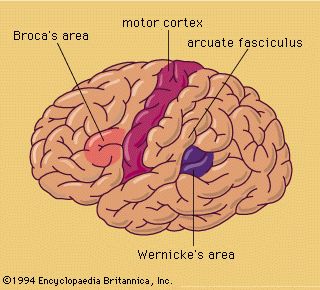
speak spoken language as a result of damage to the brain
Language use in aphasia
lA Wernicke’saphasiaexample:
Before I was in the one here, I was over in the other one. My sister had the department in the other one.
lTypical in Wernicke’saphasia: smooth articulation, appropriate pausing and intonation, appropriate syntactic structure, yet devoid of meaning
The semantic relationships between words are seriously disrupted, suggesting that the patient’s semantic knowledge was spared. l
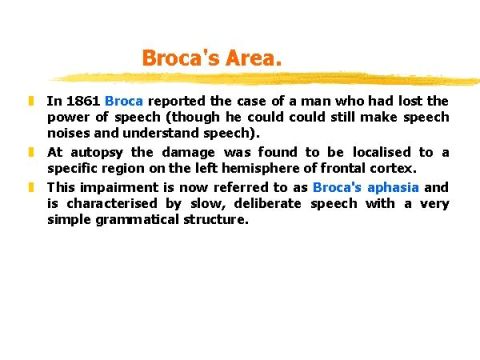
Language use in aphasia
Language use in aphasia
lDepending on the exact location of the injury, its severity, andother factors, aphasias may display a wide range of reactions. –
–
–normal comprehension, but deficient in language productionno loss of ability of sentence structure but greater than normalproblems finding wordsunimpaired in comprehension and production but be unable to repeat exactly what they have heard and understood
lIn normal individuals, various aspects of language—sentence structure, meaning, sounds—appear to form a smoothly coordinated system of communication; however, in brain-damaged individuals, this system is revealed to be a
combination of separate parts, for the deficits in such persons are often selective rather than total.
Language use in aphasia
lImplications:
Brain injuries enable us to analyze an apparently unified
program of language abilities into its separate components and raise questions about how such abilities become integrated in the normal adult in the first place.
Example 4: Language in childrenlObservation: A young child about 1 year old, communicating with his
mother.
ü
ü
üDoll, not motherMore, not milkOff, not shoes
lTentative conclusions:
–
–the child might know, at least in a tacit manner, some of the rules of language to use words appropriately. the child may have learned certain pragmatic rules to guide her choice of words.
Language in children
lAlthough there is disagreement over exactly how much knowledge to attribute to young children, it appears that children know more than they say.
Another example: Children commonly express themselves with two words at a time, as in baby gone, by eliminating the
closed-classorfunction words(prepositions, conjunctions, and so on) in favor of open-class or content words(nouns, verbs, adjectives) This pattern suggests that children have an intuitive understanding of these two grammatical classes, which is part of their syntactic knowledge.l
Question 2
How
has this field evolved over the last century?
Historical context of psycholinguisticsuPsycholinguisticsflourished twice:
ü
üaround the turn of the last century, mainly in Europein the middle of the 20th century, mainly in America
uIn the early decades of the 20th century, linguists turned to psychologists for insights into how human beings use language. In the later period, psychologists turned to linguists for insights into the nature of language.
In between these two periods, behaviorismdominated both fields, each neglecting the other.uu
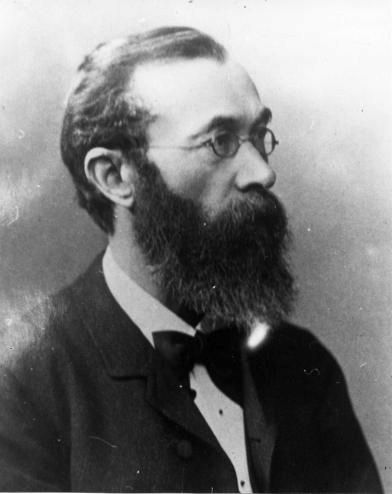
Early psycholinguistics
nGerman physiologist and psychologist
At the University of Leipzig (1875-1917),
he established the first psychological
laboratory (1879) and founded the first
journal of psychology (1881). nn
Wilhelm Wundt (1832-1920)
Early psycholinguistics
lFrom the development of the first psychological laboratory, at the University of Leipzig in Germany in 1879, until the early 1900s, psychology was defined asthe science of mental life.lWundt
–it was possible to investigate mental events such as
sensations, feelings, and images by using procedures as rigorous as those used in the natural sciences.
the study of language could provide important insights into the nature of the mind. –
Early psycholinguistics
lWundt (the master psycholinguist)
extensive writings about many different aspects of languageincluding grammar, phonology, language comprehension, child language acquisition, sign language, reading and other topicsWundt’s theory of language production
He regarded the sentence, not the word, as the primary unitof language and saw the production of speech as the transformation of a complete thought process into sequentially organized speech segments (comprehension was thought to be basically the same process in reverse).
Two notions:speech production is a word-by-word process
it begins with a whole sentence (Top-down approach)ll
Early psycholinguistics
lOther significant developments in measuring various language processes:
–Eye-voice span: the lag between eye position and voice when reading aloud, about 6 or 7 words
Tachistoscope: a machine that presents visual stimuli for very brief periods of time
Interest in eye-voice span and tachistoscoperemains very strong to this day.––
Behaviorism and Verbal BehaviorlOpposing to focus on mental life as a goal for psychology, by the 1920s, behaviorismtook over the mainstream of experimental psychology.
lBehaviorists stressed
–objective behavior, often in laboratory animals, as opposed to the study of mental processes.
a strong commitment to the role of experience in shaping behavior (environmental stimuli/ model) –
Behaviorism
lA school of psychology that confines itself to the study of
observable and quantifiable aspects of behavior and excludes subjective phenomena, such as emotions or motives.
In 1913 John B. Watson proclaimed himself a "behaviorist" and announced a new theoretical tendency within psychology. "Behaviorism," he promised, would be a "purely objective experimental branch of natural science," dedicated to the
"prediction and control of behavior." Consciousness, thoughts, and feelings would no longer be studied, he explained, just the behavior of animals—including humans. l

Chicago, at Johns and
as a he should objective, relations and
Behaviorism
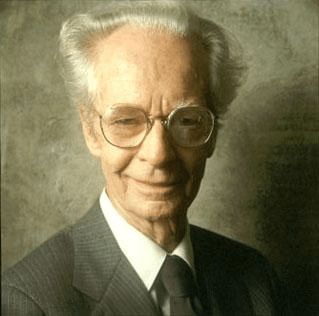
l
l
land author.He conducted pioneering work on and He also wrote a number of
controversial works in which he proposed the widespread use of techniques, primarily and increase B. F. Skinner (1904-1990)
Behaviorism
lBehaviorismseeksto explain animal and human behavior entirely in terms of
observable and measurable responses to environmental stimuli.
Behaviorism was introduced (1913) by the American psychologist John B.
stimuli. He rejected the exploration of mental processes as unscientific.
and were central to the development of behaviorism.
contended that all but a few emotions were conditioned by habit, and could be learned or unlearned.. lll
Behaviorism and Verbal BehaviorlFrom the 1920s to the 1950s, psychologists expressed relatively little interest in language. Behaviorists preferred instead to speak of “verbal behavior”.
The behavior of speaking correctly was, it was assumed, the consequence of being raised in an environment in which
correct language models were present and in which children’s speech errors were corrected.
(B.F. Skinner,Verbal Behavior) l
Behaviorism and Verbal BehaviorlThe most basic premise of the behaviorists is verbal behavior
could be conditioned by reinforcement. Similar developments were occurring within linguistics.
Evidence:
–l
–
–Opinionated statements in free conversation increased in frequency when they were followed by verbal reinforcerssuch as mmmor good. The frequency of a grammatical class, such as plural words, could be increased by reinforcing only words from that class.Subtle signs of approval (nodding) probably influence our choice of words in conversations.
Behaviorism and Verbal Behaviorl
lAnother major topic of research was meaning. (emphasize associations among words)Meaningfulness of individual words: the number of associations a person could produce in a given period of time. High-meaningfulness words were more easily learned than low meaningfulness words.
Similar developments were occurring with linguistics. Linguists of this period tended to emphasize behavioristictreatments of language, in which reference to mental states or processes was carefully avoided.
Despite the inherent interconnections between the fields, psychology and linguistics “divorced”for a period of several decades.ll
Later psycholinguistics
lThe second period of interdisciplinary psycholinguistics really took hold in the late 1950s, beginning with Noam Chomsky. Chomsky has also played a powerful role in how psychologists perceived language because he argued that the behaviorists’accounts of language were inadequate. l
Later psycholinguistics
l
l
l
l
lWriter / Linguist / Political FigureBirthplace:Philadelphia, Pennsylvania Best Known As:Creator of the theory of generative grammar Noam Chomsky is a leading linguistic scientist and a longtime professor at MIT. His 1957 book Syntactic Structuresoutlined his theories of transformational generative grammar and made him a prominent and controversial figure in the field. Chomsky is also known as a political activist suspicious of big media, big business and big
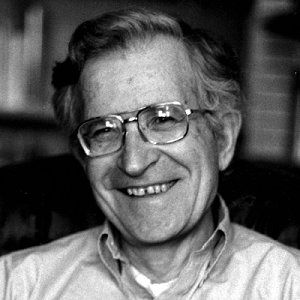
government.
Noam Chomsky (1928-
Later psycholinguistics
lBehaviorists’associative chain theory:each word in a sentence serves as a stimulus for the next word, and thus the entire sentence is produced left to right.
Chomsky’s examples against this view:
–Colorless green ideas sleep furiously.
–Furiously sleep ideas green colorless.
–George picked up the baby.
–George picked the baby up.l
Later psycholinguistics
lLanguage acquisition cannot be explained in terms of children’s language experience.
Poverty of stimulus argument:there is not enough
information in the language samples given to children to fully account for the richness and complexity of children’s language.llExamples:
–
–
–
–John believes heis incompetent. (John)John believes him to be incompetent.John wants him to win.John wants Bill to see him. (John)
Later psycholinguistics
lThe language children acquire is intricate and subtle, and the sample of speech given to them during the course of language development is anything but. Therefore, although parents may assist the child’s language development in some ways and influence the rate of development somewhat, the pattern of development is based not on parental speech but on innate language knowledge.
The revolution of the 1960s and early 1970s emphasized the role of linguistic theory in psycholinguistic research and the role of innate mechanisms in language acquisition.
These themes continue to be influential, but there are indications that psychological interest in linguistic theory has become waned.ll
Later psycholinguistics
Reasons:
lThroughout the 1960s and 1970s linguistic theories underwent rapid and (to psychologists, at least) confusing changes. These changes made it difficult for psychologists to base their studies in any linguistic view. And some psychologists became wary of linguistics, preferring instead to develop a psychological view of language that was not tied to any specific linguistic theory.lThe two fields are distinct in their methodologies. A distinction may be drawn between two intellectual traditions, rationalism and empiricism.
Rationalism
lReliance on reason as the best guide for
belief and action.
Philosophy.The theory that the exercise of reason, rather than experience, authority, or spiritual revelation, provides the primary basis for knowledge.l
Rationalism vs. EmpiricismRationalism(heredity, nature)
nEmpiricism(environment, nurture)uRationalists emphasize the
role of innate factors in
human behavior.
Rationalists emphasize the
use of argument.
For the most part, linguists
approach language in a
rationalistic manner.Empiricists stress the role of experience.Empiricists favor the collection of data as a means for evaluating hypothesis.Psychologists favor the empirical methodunnu
Current Directions
lMore interdisciplinary. (contributions from computer science, philosophy, neuroscience, and related fields)
More recent interest in phonology, semantics, and pragmatics than in syntax.
More recent interest in language production than in
comprehension(not merely the reverses of comprehension) Considerable interest in the brain mechanism associated with language
Applications of psycholinguistic principles to society(reading, bilingualism, language disorders) llll
